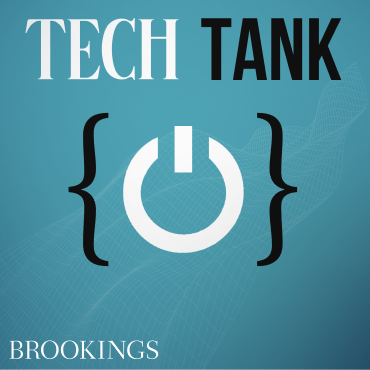TechTank, a biweekly podcast from the Center for Technology Innovation at Brookings, explores today’s most consequential technology issues. Moderators Nicol Turner Lee and Darrell West speak with experts and policymakers to share data, ideas, and policy solutions that address the challenges of our digital world.
The financial sector has long relied on artificial intelligence (AI) and machine learning for a range of duties, from administrative tasks to decisionmaking. But as the industry’s spending on the technology is expected to grow amid the explosion of generative AI, consumers still have little transparency into how AI is used and ways their lives may be affected.
These challenges persist amid companies’ efforts to innovate and the Trump administration’s focus on American technological leadership, leading to shifts in the regulatory landscape. This has included the introduction of legislation to establish regulatory sandboxes for AI firms and less oversight from independent federal agencies.
In this episode of the TechTank podcast, co-host Nicol Turner Lee speaks with Aaron Klein, the Miriam K. Carliner Chair and a senior fellow in Economic Studies at Brookings about how AI is embedded in the financial sector, the implications for consumers, and the importance of partnerships in building these technologies.
Listen to the episode and subscribe to the TechTank Podcast on Apple, Spotify, or Acast.
Transcript
CO-HOST NICOL TURNER LEE [00:00:00] You’re listening to Tech Tank, a bi-weekly podcast from the Brookings Institution, exploring the most consequential technology issues of our time. From racial bias and algorithms to the future of work, Tech Tank takes big ideas and makes them accessible. Welcome to the Tech Tank podcast. I’m co-host, Nicol Turner Lee, the director of the Center for Technology Innovation at the Brookings Institution. Headlines are currently focusing on the introduction of generative AI across various sectors. And some industries have even employed AI and machine learning algorithms for years, the financial sector being one of them. AI is being used in banking, fraud detection, credit underwriting, and data analytics. And even more so, spending on technology within financial services firms is expected to grow in the coming years. Now, this doesn’t come without some policy concerns. In fact, I don’t know how many of you really, really follow me. I know that some of you say that you just keep an eye on me wherever I go. Well, last week, I was before the House Financial Services Committee talking about AI use and financial innovation. Listen. I think there are so many promises for the efficiency in the sector when it comes to the use of artificial intelligence. But I also want us to be mindful that there are some risks, as the industry is also highly regulated and responsible for decisions that have serious implications for those of us that may end up not qualifying or being rejected or having our information stolen and the list goes on. So these discussions are challenging. And you know, since I… Testified not too long ago, I figured I’d have more conversation about this with my dear friend and colleague, who’s also a CTI fellow, Aaron Klein. Aaron is a senior fellow within the Center on Regulation and Markets and the Miriam K. Karliner Chair in Economic Studies at the Brookings Institution. I told you he’s not too far away from me. He’s an expert on financial technology, regulation, payments, macroeconomics. Infrastructure, finance and policy. Listen, if you don’t know who he is, I would highly recommend that you go to his page and you see all of the wonderful stuff that he’s talking about, not just in AI, but in the economy overall. So I wanna welcome Aaron to the platform. He’s somebody that those of you here have heard him before. But Aaron, thank you so much for being here today.
GUEST AARON KLEIN [00:02:41] Nicol, it’s a pleasure to be back.
CO-HOST NICOL TURNER LEE [00:02:43] I know I always enjoy talking to you for variety of reasons and I think today, October 1st, is a quite special day that hopefully we’ll have a time to get into as well. Let’s jump into this. I testified before House Financial Services Committee last week, talking about AI in the financial sector. I laid out some broad categories where the technology is being used. But Aaron, explain to us in more detail since I gave an overarching explanation of how and where we’re seeing AI in your sector.
GUEST AARON KLEIN [00:03:15] Yeah, so nicol, thanks. Your testimony was fantastic and I encourage everyone to go back and read it because you make some really good and nuanced points that I think a lot of folks would benefit from appreciating that AI has some really cool potentials to overcome problems in the current system and then some pitfalls to make what’s already a problem even worse. And instead of reacting into one or two base groups of future fear-mongering or. You know, technological transcendence. You scotch out in your testimony kind of the path to harness the good and hold off the bad. But to answer your question, look, we have AI in financial services. Most people know there’s an artificial intelligence that’s been dominating the world of credit allocation for a long time and it’s called FICO. FICO, you know, stands for Fair Isaac Corporation, the company that invented it. But by most measures or metrics of machine learning or artificial intelligence, it’s been one for a while. One metric I like about AI is if the computer can do something and we’re not really sure why or what it means. You know, people come to me all the time and they say, Aaron, you know, would it help my FICO credit score or hurt it if I took out a new credit card line? The answer is I don’t know and neither does FICO. Because it depends on 10 other things, which all depend on 10 things. And this AI is pretty dumb and pretty bad. Most people have heard of FICO. A lot of people know their score or think they know their scores. I don’t know, nicol, do you know your FICO?
CO-HOST NICOL TURNER LEE [00:05:01] Of course I check it all the time.
GUEST AARON KLEIN [00:05:04] And you know, what is a really good, like aspirational, you know really good FICO?
CO-HOST NICOL TURNER LEE [00:05:12] Well, you know, Aaron, I hope you’re not trying to get into my personal business. But from what I understand, it’s upwards of 800, which I’m not sure if anybody is that perfect over the course of a lifetime, except my mother. Aaron, have to say my mother is perfect. She says that she has a great FICO score.
GUEST AARON KLEIN [00:05:28] God bless her and congratulations. But you know, in my life, I can only ever think of one other thing where 800 is the goal. It’s a really weird goal when you stop and think of it. Shouldn’t the goal be a thousand or a hundred or right? The only other thing I can think of where 800 as the goal is.
CO-HOST NICOL TURNER LEE [00:05:49] Okay, what?
GUEST AARON KLEIN [00:05:50] S-A-T.
CO-HOST NICOL TURNER LEE [00:05:53] Oh! LSAT, standardized tests. I haven’t taken those in such a long time. You know, they’re also not required. So my kids are actually in college right now and she didn’t have to take it. She took it, but she didn’t really have to submit it. Go figure, I still had to pay for it though.
GUEST AARON KLEIN [00:06:09] Well, you know, there was a period where it wasn’t, I think schools are bringing it back now, but for most of us of a certain generation, we remember the SAT often, it may scare some people. There may be some shutters right now with a post-traumatic stress, but you ask yourself, why did FICO make 800 the goal? And I think the answer is they want to subconsciously appear to be more legitimate. Look, you know, you and I can have a whole separate conversation on whether the SAT is really productive, is a good standardized test, whether we should use it or not. But if you’re of our era, your SAT score mattered in terms of where you went to college, just like your FICO matters in terms whether you get credit or not!
CO-HOST NICOL TURNER LEE [00:06:53] But don’t you think, but Aaron, I wanna slow you down on this for a minute. Just stay with me for a second, you know, and folks, you can see we have a great relationship. I actually adore this colleague of mine because he’s so brilliant in the way he thinks about stuff, wait till you hear more of this episode, I’m sure you’re gonna actually give us some more insight. But I wanna say that like, but FICO compared to AI, Aaron, don’t think that that’s actually a standard metric that most people know about, right? Like I said, you have all these resources now, you can check your FICO score. If you don’t get credit, you can actually appeal it or you can dispute it. I mean, AI is looking at your social media profile. You write about historically AI is attached to the computer devices that people use that you’re more likely to get credit if you’re on a Mac versus a PC. I mean, that’s the part that scares me. Who do I run to when AI basically suggests in some way or form that maybe because I’m a black woman and I look at my credit cards all the time or I use them all the times because I’ve always shopping because the AI knows that about me, that I might not be credit worthy. I mean help me understand that. Latonya Sweetie tells us like, if your name is a certain racially ethnic sounding name that you’ll be denied credit, help me.
GUEST AARON KLEIN [00:08:08] So I’ll tell you a couple of things on that. One is if you’re shopping all the time, that’s actually not, that’s a reasonable little flag. It may not be red, it may be a little yellow for a bank to kind of go, I don’t know. But look, FICO’s are three digit numbers that are based on input data from credit reporting agencies. And Equifax, TransUnion, Experian are the big three. Those entities are full of errors. Look, there’s an Aaron Klein in New Jersey who didn’t pay his cell phone bill who held down my FICO score for 10 years. And no matter, and I was absolutely powerless to get that off my credit report because I’d lived in New jersey too and the credit bureaus have no legal requirement for accuracy. In fact, they have every economic incentive to be inaccurate because accurate is expensive and costly. And the math will tell you that as long as you’re inaccurate in both directions. That is that Aaron Klein in New Jersey got something good on his report from me and I got something bad from him that it all comes out in the wash. Because at the end of the day, these FICO scores are all getting aggregated and it just cares whether a thousand loans at a score of 750 performed this much better than a thousand loan at 700. The point I would make to you is there are good reasons that you lay out to be concerned about other pieces of information being used in credit underwriting. But if you block all those new pieces out and you just use the old data. You know, a lot of people are born and they turn 18 and their FICO has been trashed because their parent was poor and took out a loan in their name or took out an electricity bill, a gas bill, a phone bill in their kid’s name and then defaulted on that. And so FICO is full of problems. Credit reporting is full problems. In fact, there’s a really good study and I think you cited it in your testimony. From a group called Finreg Labs that looked at something called cashflow underwriting, which basically said if I take a computer and I just look at the amount of money in your bank account every day for the last two years, I have a better guess as to whether or not you’re gonna pay back that loan than if I look at your FICO score.
CO-HOST NICOL TURNER LEE [00:10:37] And so that says to me then that in the financial sector, Aaron, right, it’s highly regulated. People like you have sort of settled on the research and use cases as to what are good indicators for how we determine credit worthiness and economic viability. But then you have, again, Aaron. I mean, you still have AI. I mean help me, where does AI come into this play because what I’m thinking is, maybe there’s a space for it or maybe not. But we also know that banks are using it for processing, back office processing, fraud detection, et cetera. So give me the Aaron Klein reason for why we should use AI or why we shouldn’t get it out of there because it sounds to me, we already are fraught with a whole lot of issues in the financial services sector as it is.
GUEST AARON KLEIN [00:11:26] Yeah, so look, I think we ought to incorporate AI and we oughta do so wisely and carefully with guardrails and with some safety. But fraud detection is a perfect example, right? I just came from an event this morning at the Aspen Institute looking at frauds and scams and their estimates of one in five Americans has been fraud or scammed. But sometimes when something feels too good to be true, it usually is, but you kind of get suckered. There’s a psychology of it all. You lose your mind for a minute and you go to start to send money and it’s an AI, you know, you can’t expect a bank to have a person looking at each of your transactions. One, that’s very expensive. Two, there’s some real privacy issues. But if you run something through a giant algorithm and you got, huh, nicol, that really odd. You’ve never spent, sent money to Nigeria or Myanmar before. Why are you, and by the way, this account that you’re sending money to has had three complaints about fraud. Maybe you should think twice before you buy this person’s concert tickets that they’ve offered to you in Craigslist. An AI to detect fraud and scams, the company known as Block, a lot of us call Square, and those devices, they’re doing some interesting stuff, Zelle, Plaid, they’re all these companies in the back office and they’re a great job, number one. Number two, financial services is more than just banks and borrowing, it’s also insurance. And this gets into a tricky question, which is that if you think about it, there’s a very core tension in all of our world. One is most people believe in some form of risk-based pricing. If you’re a riskier credit risk, you should pay a higher interest rate. If you are a risker driver, you should more in car insurance. Most of us also believe in non-discrimination. We shouldn’t assume that because of an immutable characteristic of a person, that that means they’re gonna behave in a certain way or group. But people in our legal and regulatory structure are schizophrenic in this. And let me give you an example. nicol, if I said to you, women are better credit risks than men in the aggregate. Men default more. We make a lot of dumb choices. Thus, women should all get a cheaper interest rate. You might be excited or not, but it’s blatantly illegal. Congress has put in a law and it said you cannot discriminate based on gender. And I think most of us would say that’s a good thing.
CO-HOST NICOL TURNER LEE [00:14:15] Mm-hmm.
GUEST AARON KLEIN [00:14:15] Now, I have two teenage daughters. A lot of people have teenage sons out there. When they go to get their driver’s license and you have to buy car insurance for them, we know that teenage boys, and forgive me, because I used to be one, so I feel like I can say this, they make a lot of dumb, risky choices more likely than teenage girls, especially behind a wheel. This has been proven. Teenage boys are more likely to get in a car accident. When you’re 16, you’re two identical people. You could have identical twins. Same everything. The boy will pay more in car insurance. Why? Because of their gender. That’s totally legal. Why? In large part because states regulate insurance. In fact, some states have created gender-neutral insurance and often they get a political backlash from the women who say, why’d my rate just go up? And so my point here being is that I’ve picked the same metric gender. I’ve pick two different financial products, a loan and car insurance. And I’ve told you that in one aspect, society has said discrimination on this characteristic is illegal. And on the other, I’ve said, it’s totally not just legal, it’s the norm. And by the way, it is real money. And I think that gives a lot of people a pause because they ask themselves, okay, how do we wanna draw these lines between protected non-discrimination and risk-based pricing? And what you’re gonna find with AI is AI is gonna uncover lots of weird things correlated with risk. Some of which I think we would say, that’s fair. If you’re texting while you’re driving and the AI knows that you like to text and drive, you should pay more in car insurance. I think most people would say, that’s a risky behavior, that’s on you. But now the AI goes and says, well, your glasses prescription is a little higher than someone else’s. Should you pay more in AI? Well, if you’re both wearing your glasses, but what if the computer says that people with worse vision, or we’ve noticed that your reaction time’s a little slower because you got cut from a few sports teams. I think we get a little bit pause. And so this is one where we don’t understand that technology is gonna start to find these connections and it’s gonna find them faster than we can sit around in a room and say, okay, not okay.
CO-HOST NICOL TURNER LEE [00:16:58] I mean, I love the way that you point that out because a lot of my work, as you know, is sort of identifying where this discrimination might occur, particularly for protected classes, right? Because the same correlations that we’re making can show up if you happen to be a person of color or you’re low income or you’ve got marginal credit that could determine the extent to which you’ll be a riskier investment, not just to get a bank account, but to get that car insurance that you’re speaking about. Now, Congress, you know, in the last administration, there was a lot of talk among several members to sort of come up with more accountability structure and legislative directives that helped to avert some of the discrimination that you’re speaking about. This Congress, under the Trump administration, is basically suggesting we’re gonna sort of move through with innovation and put the foot on the gas as opposed to thinking about some of things that you are suggesting. And one interesting thing that’s come out that came up in my hearing as well is this use of regulatory sandboxes. So the idea that, again, under the current AI action plan of this administration, just to sort of preface that for our listeners who may not be following DC politics quite closely, it’s allowing for companies to sort of work on solutions perhaps to some of the problems you’re talking about in terms of bias mitigation, products going to market quicker. New products that we’ve not even thought of, but to do it in what’s called a regulatory sandbox where there’s some protection. Now, under this administration, the protection is do whatever you want because we’re really not gonna give you any oversight on this, right? That’s a simple way of putting it. I’d love to hear your take on regulatory sandboxes, particularly at this time, and whether or not that’s a really good idea to sort of do the work you’re talking about, really thinking through. The role that AI could potentially play as we look at this myriad of proxies that could show up.
GUEST AARON KLEIN [00:18:56] Yeah, so let’s talk about this for a little bit because I appreciated your testimony was very nuanced on sandboxes.
CO-HOST NICOL TURNER LEE [00:19:05] And you saw, I quoted you, Aaron , in fact, in my oral, I said your name. I just wanna let you know.
GUEST AARON KLEIN [00:19:10] I always appreciate that because sandboxes were tried and were pretty successful in England, but in the British context, there were consequences and there was government oversight there. And they’ve also been tried in several states, Arizona notably. State-based sandboxes are a little difficult because a lot of times in financial services, we’re talking about size and scale and products. It’s also hard sometimes in states to make sure that your product is just being used by residents of your state or driving in, et cetera. When my kids were little, I always thought of the sandbox as the place where I dropped them off to play unsupervised while I talked with their parents. And every experience of mine ended up in a sandbox and it started out great. The kids were having a good time. Then I kind of ignored them and it either ended with them throwing sand at each other. Or one kid sitting in a wet puddle of sand. And I’ve always kind of thought that there’s an interesting way to describe them as greenhouses. When I think of a greenhouse, I think have a controlled environment with maximum transparency and sunlight so everyone can look in and see what’s growing in a special controlled environment. And then if it’s successful, perhaps you can transplant it outside into the wilderness and let it take off. And so I tend to think that the right answer is to try some of these things in more controlled environments. We do that with medicine and other scientific examples. People have to be informed when they go in. This is a new product. We’re not quite sure how this is gonna work. Do you consent to letting these other things look in? And we’re seeing some of that. Some car insurances will let you opt in. If you give them access to your phone while you drive and it can tell how fast you’re driving and whether you’re texting, then you’ll get a lower rate. That seems to be okay. Now, there’s a reasonable concern in which some of this is a bit of a zero sum, right? Particularly in the world of insurance, but also somewhat in the word of lending that if one group’s getting a better deal, that means I’m getting a worse. And so if I’m not opted in, then I’m doing worse. Well, maybe, but this gets back to that core tension, which is how much do you wanna be risk-based? Which is, people who drive faster are riskier drivers who should pay more in car insurance. Adverse, how much you just wanna be immutable? I have a right to privacy and I don’t want my car insurance to be able to look at my phone all the time. I get that, the same with banks. Maybe I don’t want this auto dealer to look at and see how much money I have in my bank account every day, because that’s gonna change how they negotiate the car price when I go to the loan. So there’s a tension in here, but I tend to think that responsibly moving forward is a better solution than either a Wild West where you just drop off the kids in the sandbox and come back in 20 minutes, or a. Reflective, no, no no, there are too many downsides we can’t move forward, which I think unfortunately the last administration got caught in a little bit too much of analysis paralysis. And technology’s moving faster, Moore’s Law is pretty brutal and the current status quo is pretty bad. One of my frustrations with a lot of my friends on the left is there’s a simultaneous argument that the status quo was really problematic. And we should be really afraid about adopting change. I just see a core tension in those two positions.
CO-HOST NICOL TURNER LEE [00:23:07] And that makes me wonder then what’s the better solution, right? If it’s not a regulatory sandbox and I don’t wanna give away what you told me the other day as we were passing each other, but is there another solution that we should be looking at that makes this process much more transparent?
GUEST AARON KLEIN [00:23:23] So I kind of like this greenhouse idea where folks-
CO-HOST NICOL TURNER LEE [00:23:25] Bingo, you said it, you say it. Wait, say it, because I think it’s brilliant. Go ahead.
GUEST AARON KLEIN [00:23:30] Yeah, I mean, folks can go in. They can set up a controlled environment. They can let the regulators look in. They can the consumer groups look in because there are groups out here that are looking for consumer abuse. There can be an agreement that this is a trial. If something bad happens, there’s some safe harbors here. Just like what people do with drugs. When you’ve tested something enough that you think it’s gonna work and there’s a reasonable likelihood of success, you have trials. We’re thrilled when we find a good trial and there’s a brand new drug that helps millions of Americans control a chronic disease, but sometimes a drug trial doesn’t work and some people have some pretty nasty side effects and that’s horrible, but that’s what happens when you move forward and have advances. So I like this idea of allowing new technology be tried in controlled and transparent environments. What I fear is… The current crowd is… Especially with the defunding of the Consumer Financial Protection Bureau, they’re gonna fire every enforcement attorney and not bring any new case. If you take the cops off the beat, yes, crime reports will go down. That doesn’t mean crime has. I’m worried that this current crowd is too focused on innovation without protection, particularly if the word crypto is involved, but I was a little frustrated in the last… Crowd was too concerned with making sure that everything would work and wouldn’t try anything new and that boxed in the status quo. And let me tell you, I think FICO is a horrible system that we’re all stuck on that has rampant discrimination and harms millions of people and doesn’t protect us financially. I don’t have to go through with you the subprime mortgage crisis where they said everybody’s credit score was… Was good enough to get mortgages that common sense would tell you these people couldn’t afford and we’re gonna blow up. So I don’t think the current FICO system is that great and worth protecting. I’m not gonna give away the secret of the movie Fight Club, but for those of us who’ve seen it, and I think we’re long enough in spoilers, the very end plot was to blow up all credit reporting. And you ask yourself, credit reporting is a very old technology. And it is not clear that whether or not you paid a bill on time 12 years ago has anything to do with your likelihood of defaulting going forward. And it’s clear that knowing how much money you have in your bank account…
CO-HOST NICOL TURNER LEE [00:26:08] This is so interesting to me because when you start to put in some of this technological advance that is accelerating efficiency to your point, and this is sort of what I argue in my research, if you put it on top of fractured systems or systems that have not necessarily been updated in terms of policy or program, essentially AI is just gonna augment that dysfunction. And so I really appreciate what you’re saying. It’s like going to dinner for a holiday. And you still have that uncle there, and you just know that they’re not gonna change their mind on the things that they believe or think about. So you might as well just get ready that you’re gonna have that conversation again every holiday, right? Because you’ve not necessarily solved the problem. You might’ve put out a few more entrees and more appetizers, but I love how you’re really talking about this. We really have to have these fundamental conversations around how we pose it, credit and lending and eligibility and. Systems that are pretty much archaic and outdated and how we integrate AI into this. And that’s why I fear too, Aaron , that financial services companies are sort of leveraging AI, but not necessarily fixing things that need to be evaluated and reevaluated for the efficacy. You know what I mean?
GUEST AARON KLEIN [00:27:24] Oh, look, look. I wish I was wearing my sweater that would make me look like the drunk uncle character on the Western Old School. But the reality of the situation and one of the problems is that as the temperature in Washington gets hotter and hotter and you reference the shutdown that we’re having right now and not just the shutdown, but I mean, you know. You talk about the president using deep AI fakes on his official channel that had clear racist overtones and put words quite literally in the mouth of the minority leader and the boiling in symmetry political anger that is being heated up on both sides, I don’t believe symmetrically, but certainly it’s on both sites to some degree. It precludes having an honest and safe space. You know, you and I can go back and forth. We can be from very different backgrounds, but we can have an open and honest conversation and acknowledge certain facts and realities and then try to say how to address it going forward. It is very difficult to have this conversation in this type of environment. I’ll close with another little interesting tidbit about AI and credit. It is, do you remember the research that showed that the top two reasons that people default?
CO-HOST NICOL TURNER LEE [00:29:01] Which one is that? Cause it’s been a lot.
GUEST AARON KLEIN [00:29:02] It’s been a lot. It was a young Harvard law professor by the name of Elizabeth Warren, which already a few people may have closed their ears on, but she found, and this has been replicated by many others, that the top two reasons people defaulted on loans were medical problems and divorce. And those were the two leading predictors of default. Now, medical problems, I think people tend to think are a little, well, that, you know, not necessarily your fault, right? If somebody has, you should we not lend to somebody because we think they’re at a high risk of cancer? You know, I think a lot of people would be very concerned about that and say that’s unfair discrimination. Now, divorce is a little bit of a different story. I used to give this example in conferences, and then I realized it made people uncomfortable in the audience, but there are AIs at your bank that have a pretty good idea whether you’re cheating on your spouse. And you know, let me give you a hint. If you’re booking hotels in the city you live in, if you’re, you know ordering room service at 2 a.m. In a place that isn’t your house, I’ve had bankers tell me that they develop little AIs and started flagging people as credit risks. And they realized they were just picking up divorce. If you’re in marriage counseling, you’re going to see a marriage counselor, right? Now, turns out that when we passed in the 70s, America had this big push in financial services to get rid of discrimination. And we put in all these protected classes and a raft of laws in the 1970s. A kind of rebirth of the progressive era. One of the things that we did was we protected on marital status. It’s actually a protected class in bank lending. And it was done because unmarried working women, which was growing radically in the 70s, were not getting loans because the bank officer was saying, who’s your husband? And they’d say, I’m not married. And they go, oh, come back, come back sweetheart when you have a husband. And then we’ll talk to him. Women were rightfully infuriated by that. Laws were passed to make that illegal. I have a single, I grew up with a single working mom and I’m incredibly thankful for that. And that’s the right thing to do. But now you say to yourself, huh, this is kind of, this is a tension of the use of AI. And it’s one that, you know, is a little bit sometimes uncomfortable for people to talk about. Just like race, just like gender. And I’m very pessimistic that we’re gonna be able to have an honest conversation at this moment with everything else that’s going on in society. And so I’m kind of hoping that there’ll be a calm after this storm where we can piece this thing together.
CO-HOST NICOL TURNER LEE [00:32:08] Well, and I think that’s so interesting. I mean, as a person who’s gone through a divorce, you’re completely correct that there are many economic vulnerabilities that come with that. And to your point, you know, part of the use of AI should be a positive narrative, right? On how it’s helping people build wealth. But again, you and I both know, being denied credit or a home ownership loan or something else, it only widens, you know, your economic opportunities. But for. Racial minorities in particular, it widens the wealth gap, which I think at the end of the day, it’s really not just about what you can buy today. I keep telling myself that, Aaron , like I know I love certain things I wanna buy, but it’s about the future and what you’re gonna invest in your children. And you know, that’s why having a home is important and all that stuff. In fact, we gotta have this conversation. I was in a conversation just recently with somebody said, maybe home ownership is not the only thing that actually creates wealth. But before you go there, I’m just gonna have you back on my friend and we’ll talk about that as well. Because I think AI will have something to do with that going forward. Aaron , it is always a pleasure to have you on the Tech Tank podcast.
GUEST AARON KLEIN [00:33:17] Cole, I learn so much every time I talk to you and I look forward to doing this again sometime.
CO-HOST NICOL TURNER LEE [00:33:22] And really for our listeners out there, we actually do like each other. This is what civility looks like. So I wanna stress what Aaron said. We have some differences on some things, but for the most part, we’re greenhouse about our car. I think I’m gonna use that, Aaron . We’re greenhouses, right? When it comes to our conversation.
GUEST AARON KLEIN [00:33:38] Take it and run with it. You have a gift of language.
CO-HOST NICOL TURNER LEE [00:33:41] You think it’ll make the Webster’s cool word of the year? Greenhouse, everybody should be about the greenhouse.
GUEST AARON KLEIN [00:33:48] In my world, it’s 5786. 2026, we can work on greenhouse for that as well.
CO-HOST NICOL TURNER LEE [00:34:00] Well, thank you so much for joining me, Aaron .
GUEST AARON KLEIN [00:34:02] Thank you for having me, Nicol.
CO-HOST NICOL TURNER LEE [00:34:04] And for all of you, you can find more of Aaron Klein’s work on the Brookings webpage at www.brookings.edu. And while you’re there, explore more content on tech policy issues from Tech Tank. That is our signature newsletter that Aaron contributes to that keeps up-to-date issues in tech policy front and center. This concludes another insightful episode of the Tech Tank podcast. We make. Bits into palatable bites. Until next time, thank you for listening. Thank you for listening to Tech Tank, a series of roundtable discussions and interviews with technology experts and policymakers. For more conversations like this, subscribe to the podcast and sign up to receive the Tech Tank newsletter for more research and analysis from the Center for Technology Innovation at Brookings.
The Brookings Institution is committed to quality, independence, and impact.
We are supported by a diverse array of funders. In line with our values and policies, each Brookings publication represents the sole views of its author(s).











Commentary
PodcastWill AI democratize financial services? | The TechTank Podcast
Listen on
October 6, 2025